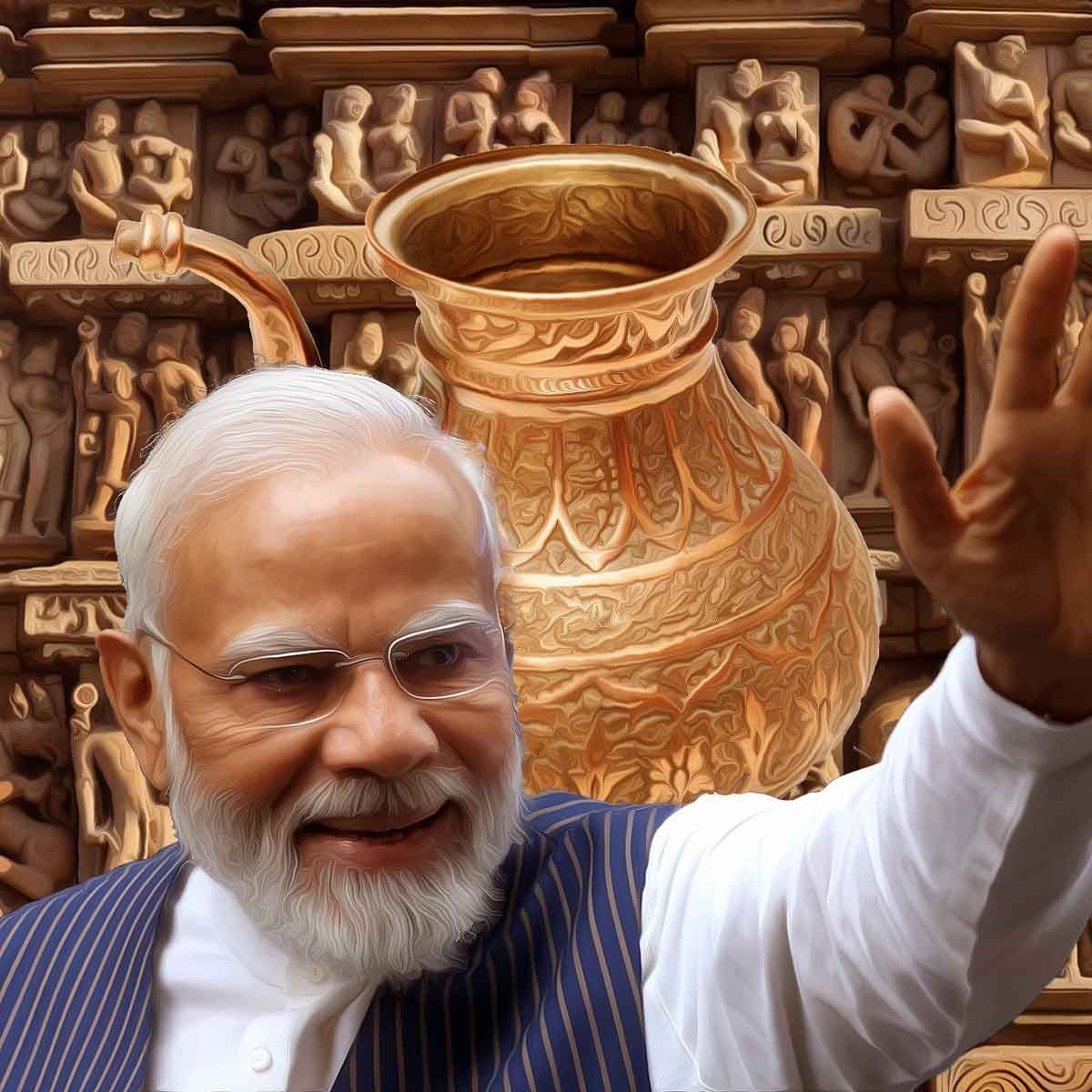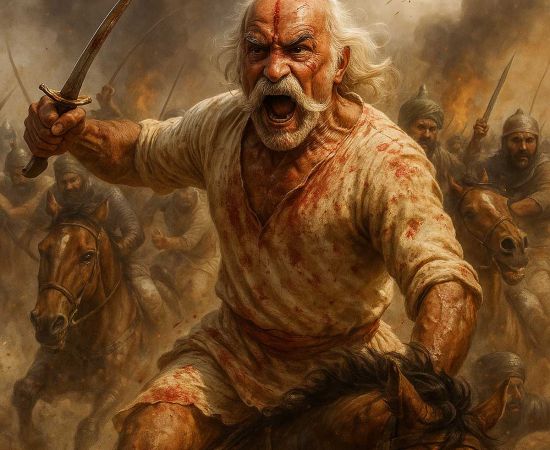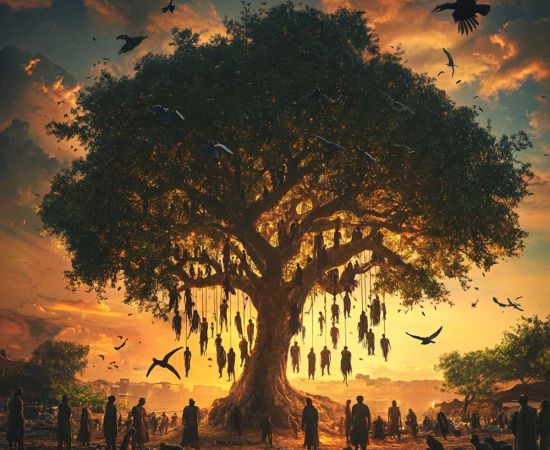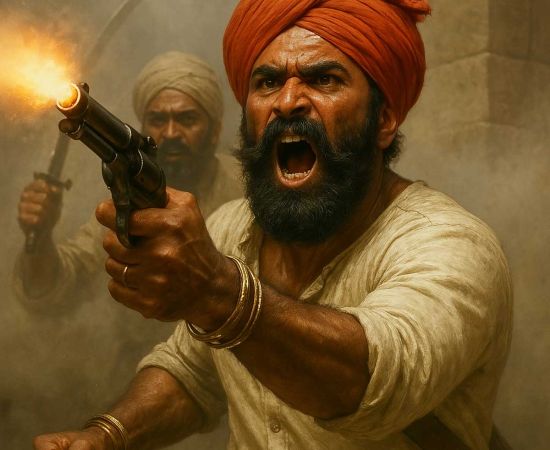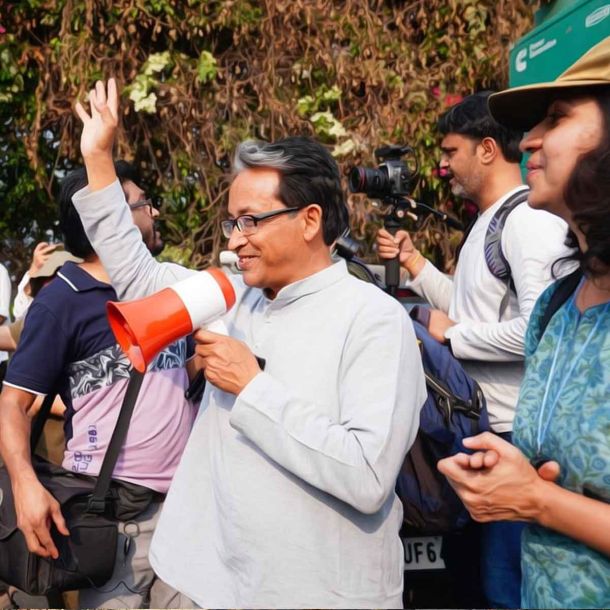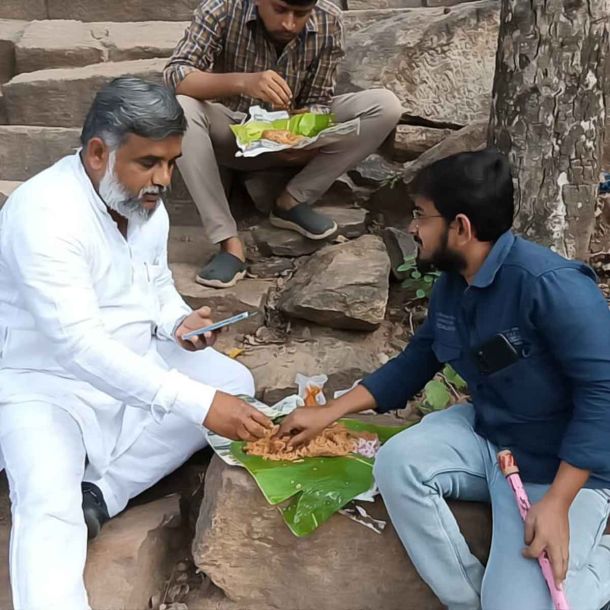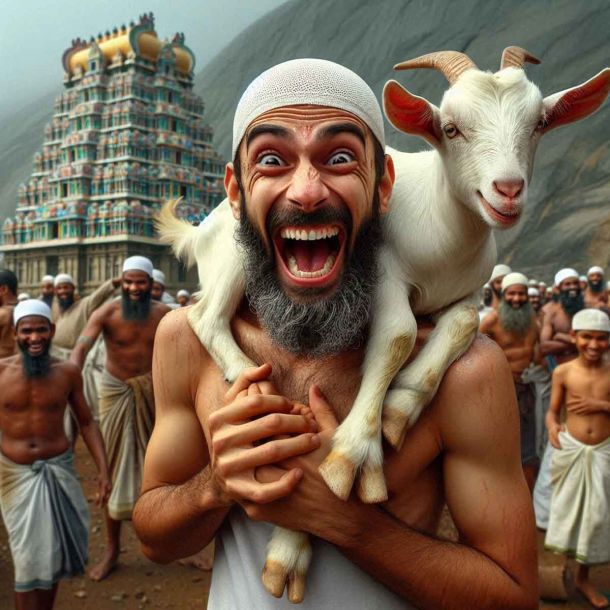MORE COVERAGE
Twitter Coverage
Satyaagrah
Written on
Satyaagrah
Written on
Satyaagrah
Written on
Satyaagrah
Written on
Satyaagrah
Written on
JOIN SATYAAGRAH SOCIAL MEDIA
An Instagram spat between a Hindu and Muslim teen in Nanpara, UP, spiraled into chaos as thousands of Islamists flooded the streets with "Sar Tan Se Juda" chants, doxxing the Hindu boy and demanding his arrest in a disturbing show of religious intolerance
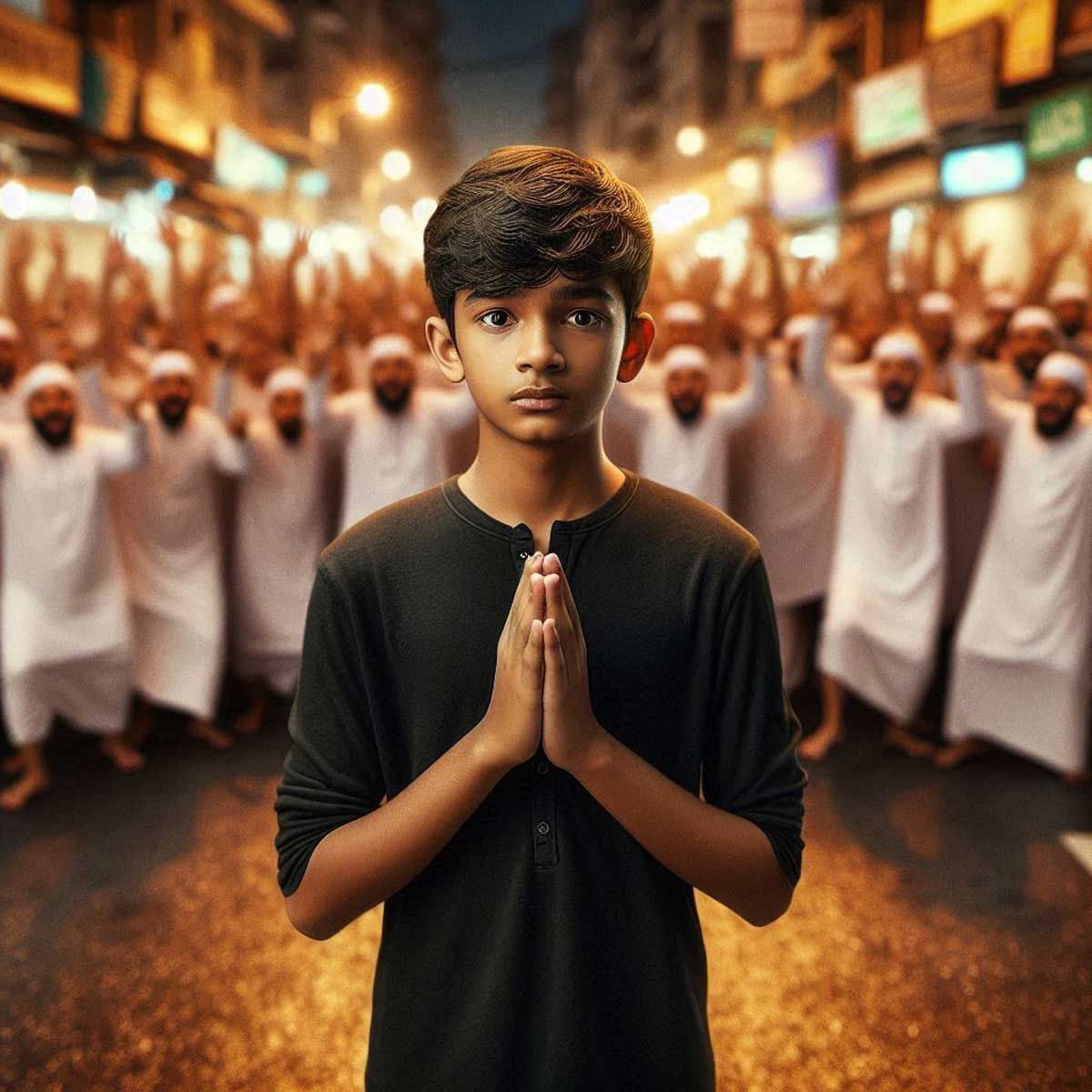
On Monday, 7th October, a seemingly regular online disagreement between two school-going teenagers turned into a disturbing event. The teenagers, one Hindu and one Muslim, engaged in a private conversation via Instagram Direct Messages. Initially, the discussion was ordinary, but around 5 PM, the tone shifted. Their conversation took a sharp turn towards religion, and as things escalated, both teenagers made remarks about each other's faith. However, it was the Hindu teenager’s comment that caused an unexpected uproar. The Muslim teenager made the Hindu boy’s comment public, allegedly spreading a message that included derogatory language towards Prophet Muhammad.
|
The situation quickly spiraled out of control when the post went viral across social media platforms, and anger began to build within the Muslim community. What had started as a private exchange between two students had now become a flashpoint for public outrage. Thousands of people, identifying as Islamists, took to the streets, their chants reverberating with demands of "Sar Tan Se Juda," a slogan that calls for beheading in response to the insult to their prophet. These furious protesters were not simply calling for legal justice but were insisting on the arrest of the Hindu teenager, fueling tension across the town.
The scene unfolded in Nanpara, located in the Bahraich district of Uttar Pradesh. The streets became chaotic as the situation continued to escalate. Responding to the viral post, the Hindu teenager became a prime target, with his personal information being publicly revealed – a practice commonly referred to as doxxing. The internet outrage had now reached dangerous levels, putting the boy's safety at serious risk.
The intensity of the situation prompted immediate action from the authorities. CO Nanpara and Inspector Pradeep Singh, along with a large police force, arrived at the scene as soon as the protest reached alarming levels. Attempting to control the crowd, they reassured the agitated Islamists that appropriate legal measures would be taken against the Hindu teenager. Yet, their assurances did little to calm the rising anger. The protesters remained adamant, demanding immediate arrest.
As the situation continued to deteriorate, law enforcement officials had no choice but to deploy additional police forces to the area. The atmosphere remained tense throughout the night, with the police employing mild force in their attempts to disperse the crowd. Yet, despite their efforts, the protests dragged on, and a case was officially filed against the Hindu teenager. The authorities were now engaged in a delicate balancing act, trying to maintain peace and calm in the town.
In an official statement posted on X (formerly known as Twitter), the Bahraich police confirmed their swift action regarding the incident. The post read: “Taking immediate cognisance of this objectionable post, a case has been registered under the relevant sections, and the accused will soon be taken into police custody. Bahraich police are committed to maintaining peace and harmony in the district.”
|
Background of the Case
On Monday evening, two teenagers, one Hindu and one Muslim, both residents of Nanpara town, were engaged in a social media conversation that soon turned into a heated argument. The disagreement stemmed from their religious beliefs, and in a moment of frustration, they exchanged comments that were offensive towards each other’s faith. The Muslim teenager shared a controversial video of Maulana Salman Azhari, in which Hindus were referred to as “dogs.” This provoked the Hindu teenager, who, in retaliation, used derogatory language against Prophet Muhammad. The Muslim boy quickly took screenshots of their chat and made them public on social media platforms.
The consequences of this online spat were swift and alarming. The Hindu teenager found himself being targeted, as his personal details were leaked online – an act commonly referred to as doxxing. This revelation set off a chain reaction, with thousands of Islamists taking to the streets in protest. Their demands were unequivocal, raising chants of "Sar Tan Se Juda," calling for severe punishment for the Hindu teenager. The situation grew increasingly tense, forcing the local authorities to intervene.
Inspector Pradeep Singh, CO Pradyumna Singh, and SDM Ashwani Pandey were among the senior officials who rushed to the scene as soon as news of the protests reached them. Their immediate goal was to calm the agitated crowd and bring the situation under control. Despite their efforts to reason with the protestors, the Islamists were insistent, demanding the immediate arrest of the Hindu boy. This led to more unrest, and the crowd grew increasingly hostile.
As tensions escalated, the police were left with no option but to take stronger measures. A lathi charge was employed to disperse the unruly crowd, as the situation had worsened beyond what initial negotiations could resolve. The need for additional security forces became evident, and police reinforcements were called in from four nearby police stations. Along with regular police forces, PAC personnel were also deployed to the site to ensure law and order.
To manage the chaotic scene, the police used drones to monitor the crowd's movements and maintain surveillance over the area. Warnings were issued to prevent the spread of rumors, as tensions remained high, and any misinformation could further incite violence. The police repeatedly reassured the public that strict action would be taken against anyone attempting to disturb the peace, and they urged everyone to stay calm during these troubling times.
One of the protestors, speaking to the media, voiced his grievances about the ongoing disrespect towards their religion. “There has been disrespect towards our Prophet, the accused teenager must be arrested. Everywhere, people are speaking against our Prophet,” the protester stated, reflecting the widespread anger within the community. According to a report by Sudarshan TV, another Islamist mentioned that he had first learned about the derogatory post from an announcement made at a local madarsa. “I learnt that someone disrespected the Prophet at Madarsa Hussaini,” he said, underscoring how quickly the news spread through the community.
|
Details of the FIR
In the aftermath of the incident, a formal complaint was lodged at the Nanpara Police Station by two locals, Rahmat Ali Hashmi and Ashiq Ali, residents of Bhaggapurwa. Their complaint detailed the offensive nature of the comments made, sparking significant tension in the region. Based on their statements, the police filed a First Information Report (FIR) under Sections 298, 352, and 353 of Bharatiya Nayay Sanhita (BNS). The FIR accused the Hindu teenager of making a deeply hurtful comment against Prophet Muhammad, which led to widespread outrage across the area.
According to the complaint, the offensive remark was posted from the social media account of Haider, son of Zeeshan, a resident of Mohalla Patharan, Nanpara. Locals have expressed their concerns, describing the incident as a deliberate attempt to fuel religious tensions and incite hatred within the community. The complainants were adamant that if swift legal action was not taken against the Hindu teenager responsible for the comments, it could jeopardize peace in the region.
The complaint also emphasized the seriousness of the situation, noting that such an offensive comment had deeply hurt religious sentiments, posing a severe risk to the area's peace and harmony. Understanding the gravity of the situation, SD SSI Prakash Bandh promptly ordered an investigation into the matter. Authorities were fully aware that the situation could quickly spiral out of control if not handled properly.
In a media briefing, ASP Rural Pavitra Mohan Tripathi provided further clarity on the situation, stating, “The two teenagers, both students, were discussing religion on social media, during which they made comments on each other’s religion. As soon as the news of the students’ chat spread, a large crowd gathered outside the house of one of the students due to it being evening. A case has been registered regarding the incident, and further legal action is being taken. The police have been deployed to maintain peace. Security has been put in place in the area due to the ongoing festive season.” His statement confirmed that tensions were already running high, especially with the festive season underway, adding an additional layer of complexity to maintaining order in the region.
The local police have also been proactive in their efforts to prevent further unrest. The police have appealed to the public, urging people to avoid spreading any false information or rumors that could escalate the situation. They also issued warnings to those who might attempt to disturb the peace, emphasizing that strict action would be taken against anyone found inciting violence. To ensure stability, local police and PAC personnel have been deployed in the region, their presence a visible sign of the authorities' commitment to restoring and maintaining peace during this volatile time.
|
Hindu Teenager Apologises, But Muslim Mob Overreaction Raises Questions
In the wake of a social media spat, the Hindu teenager involved has shown maturity and responsibility by offering a heartfelt apology for his remarks about Prophet Muhammad. In a video message, he stood with folded hands and sincerely said, “I made a mistake. I will not make such a mistake again. I was unaware of the consequences. I apologise with folded hands. I will not make this mistake again.” This act of humility should be acknowledged as a constructive gesture aimed at de-escalating tensions and restoring peace in his community.
However, the events that followed raise serious questions about the disproportionate reaction from the Muslim community. While the Hindu boy's comment was wrong, it is essential to remember that this argument began when a Muslim teenager shared a video from controversial Maulana Salman Azhari, who openly referred to Hindus as “dogs.” How is it that derogatory remarks about Hinduism can be made so freely without sparking similar outrage, but any comment on their own faith leads to calls for beheading and large-scale protests? This hypocrisy cannot be ignored.
The fact that the Muslim boy who spread the post was quick to go public and incite further unrest speaks volumes. Instead of resolving this matter privately as it began—between two teenagers—he chose to escalate the situation to dangerous levels. The "Sar Tan Se Juda" slogans and demands for the immediate arrest of the Hindu boy were not only excessive but also demonstrate an unwillingness to engage in dialogue or show tolerance. Is this really the message we want to send—that any perceived slight against one’s religion can justify violent threats and public disorder?
What makes this even more concerning is that when similar offensive remarks are made against Hinduism, no such outrage is seen. Hindus are often expected to tolerate insults and move on. But when the tables are turned, the reaction is immediate, hostile, and extreme. This double standard cannot be allowed to continue if we are to maintain a society where true religious tolerance exists.
By offering a sincere apology, the Hindu teenager did what many in his situation might not have done—he took responsibility for his mistake and made an effort to calm the situation. His actions show that Hindus, in the interest of peace, are willing to take steps toward reconciliation, even when they are the ones being targeted. This act should be seen as a step toward peace, but it must be met with equal gestures of tolerance and restraint from all sides. Otherwise, we are setting a dangerous precedent where one community’s voice is silenced while another’s demands are catered to through fear and intimidation.
|
Media Houses and Social Media Users Leaked Personal Information of the Hindu Teenager
Despite legal norms that clearly state leaking personal information of a minor, even if accused, is prohibited, several media houses and social media users openly violated this rule. One such incident came to light when Bharat Samachar Live published both a photograph and a video of the Hindu teenager, where he was offering his apology. Shockingly, they failed to blur his face, thus exposing his identity to the public.
This kind of exposure wasn't limited to traditional media. Social media users also played a part, further spreading the Hindu teenager's personal details. A user by the name of Sartaj shared a post in Hindi, stating, “Bahraich, UP: A tense situation has arisen after an offensive comment was made about Prophet Muhammad. A boy from Nanpara had made this comment on Instagram, following which members of the Muslim community took to the streets and protested strongly. How is hatred against Islam being instilled in underage children?” Posts like these not only amplified the situation but also added fuel to the already blazing fire of communal tension.
The incident where the Hindu teenager was doxxed for making a comment about Prophet Muhammad highlights a disturbing reality of the digital age. Social media, a platform originally meant to connect people, has increasingly become a tool for weaponising personal information and putting innocent lives at risk. What started as a simple argument between two teenagers from different communities was unnecessarily blown out of proportion. A conversation that should have remained private quickly escalated into a communal firestorm, all because comments were made about each other's religion—something that, of course, should have been avoided.
Amid this entire incident, it is the Hindu boy who was singled out and treated unjustly. His personal information was first leaked by the Muslim boy involved in the argument, and then it was made viral by members of the Muslim community. The threats of beheading, symbolised by the now-infamous slogan "Sar Tan Se Juda," were raised against him, exposing just how dangerous the situation had become for this minor.
The deliberate doxxing of the Hindu teenager by online trolls didn’t just put him at risk—it turned him into a target, leading to mob outrage. This level of targeting even led to an FIR being registered against him, with the possibility that he might face arrest, all for what essentially began as an online spat between two schoolmates. This kind of response is not only illegal but also highly unethical, as it puts an innocent minor’s life in danger under the guise of religious offence.
Moreover, the media houses' failure to protect the Hindu boy’s identity, despite clear legal guidelines, is deeply troubling. Such actions point to a lack of accountability and a willingness to fan the flames of controversy, no matter the consequences. Authorities now bear the responsibility to ensure that justice is served, not just in relation to the legal proceedings against the teenager, but also by holding those responsible for his doxxing accountable. The deliberate targeting of minors in such a malicious way must be swiftly dealt with to prevent similar incidents in the future.
In the end, it is crucial that we recognise how social media and media platforms can easily become dangerous weapons in the wrong hands, leading to irreversible harm, especially when the lives of vulnerable minors are at stake.
 |
 Support Us
Support Us
Satyagraha was born from the heart of our land, with an undying aim to unveil the true essence of Bharat. It seeks to illuminate the hidden tales of our valiant freedom fighters and the rich chronicles that haven't yet sung their complete melody in the mainstream.
While platforms like NDTV and 'The Wire' effortlessly garner funds under the banner of safeguarding democracy, we at Satyagraha walk a different path. Our strength and resonance come from you. In this journey to weave a stronger Bharat, every little contribution amplifies our voice. Let's come together, contribute as you can, and champion the true spirit of our nation.
 |  |  |
| ICICI Bank of Satyaagrah | Razorpay Bank of Satyaagrah | PayPal Bank of Satyaagrah - For International Payments |
If all above doesn't work, then try the LINK below:
Please share the article on other platforms
DISCLAIMER: The author is solely responsible for the views expressed in this article. The author carries the responsibility for citing and/or licensing of images utilized within the text. The website also frequently uses non-commercial images for representational purposes only in line with the article. We are not responsible for the authenticity of such images. If some images have a copyright issue, we request the person/entity to contact us at satyaagrahindia@gmail.com and we will take the necessary actions to resolve the issue.
Related Articles
- Maulana Usmani says Muslims must continue to defend the honour of the Prophet without fear, terms it ‘peaceful mission’: Old videos show how Maulana was greeted with chants of ‘Sar Tan Se Juda’
- In a shocking incident, Taufiq and 3 others brutally attacked a Hindu youth ITI student Shashank for speaking to a Muslim girl: Karnataka
- Despite immense sacrifice by Hindu community in the liberation war they are subjugated denominations in the country. Bangladesh seized 26 lakh acres of land from Hindus under black law of “Enemy Property Act”
- Tension gripped Baghpat after a Hindu boy Sandeep Dudhiya was brutally attacked by his Muslim friend Muhammad Feroze, who slit his throat with a sharp knife: The boy is battling for his life
- Bulldozer did deserving action in Jahangirpuri: Illegal Masjid gate razed, mazaar on-road and other encroachments removed before SC halts demolition drive: Only encroachment of government land demolished
- Result of collective myopia or paralysing hope is that we fail to see the patterns of Islamic aggression that have repeated themselves since time immemorial: Unfolding Khilafat 2.0 posters in 2019 to 2022 attacks on Ram Navami processions
- Neeraj Prajapati, part of the pro-CAA tricolour march in Jharkhand was killed by a frenzied Muslim mob with an iron rod: Two years later his family still awaits justice
- Angry Hindu worshippers caught a Muslim youth Yakub red-handed vandalizing idols placed in a Shiv temple in Muzaffarnagar: Yakub handed over to the police, demanded a fair and speedy trial, no violence reported
- Fact-finding reported Jahangirpuri as a ‘ticking bomb’ of illegal immigrants, radicalisation, demographic stress, and illegal encroachments: Islamists resorted to stone-pelting, arson, and vandalism during Hindu procession
- Bajrang Dal's peaceful rally in Mewat (mini Pakistan) is painted panic mongering by Islamist Media
- 23 Jan to 29 Jan - 2022 - Hindus under attack: Bulletin roundup of persecution, discrimination, and hate crimes against Hindus
- Online Syndicate of radical Islamists that was targeting people for demanding justice for the slain Hindu Youth is exposed by Social Media user: Kishan Bharwad murder case
- ‘Casteless Hindu’ is Not a Paradox. It is The keystone of ‘Ghar Wapsi’ and Hindutva
- Shaikh Abrar Shaikh Jamil alias Shahrukh was taken into custody after 31 swords and a khukri was recovered by the police, had ordered massive quantities of swords and khukris online using a fake ID: Aurangabad, Maharashtra
- In the latest development in Kishan Bharwad murder case, Ahmedabad police have arrested two suspects, Hindu organizations have called for a bandh protesting against the murder














